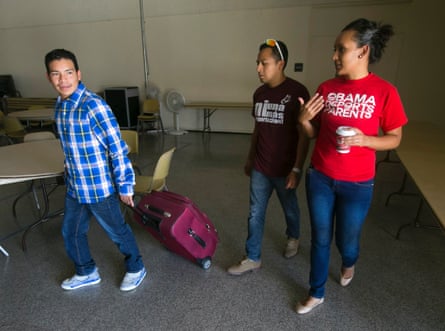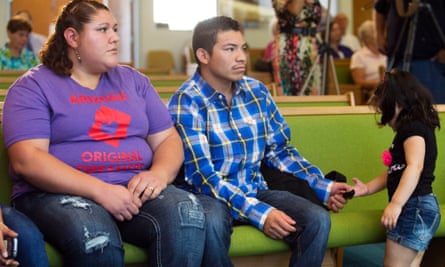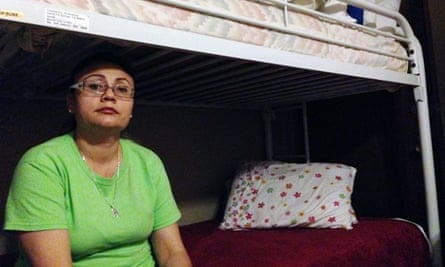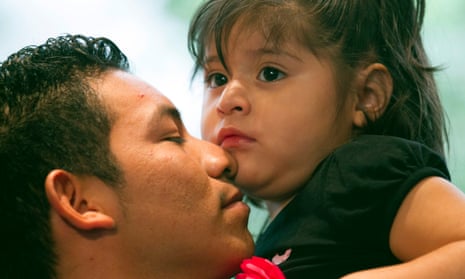On her 27th day of living in a tiny room at a Tucson church known for pioneering the popular migrant sanctuary movement in the 1980s, Rosa Robles Loreto swept a courtyard, prayed with a group of parishioners and greeted her uniformed son fresh off his baseball practice.
Robles Loreto is a 41-year-old Mexican migrant who lacks legal status and is facing deportation after getting pulled over for a traffic infraction four years ago. She has vowed to remain in Southside Presbyterian Church until federal immigration authorities grant her leniency.
Robles Loreto is the third migrant to take sanctuary in a church this year in Arizona, reviving a popular movement from the 1980s that sought to help Central American migrants fleeing civil wars stay in the U.S. by letting them live inside churches, where immigration officials generally do not arrest people.
Although the latest version of the movement so far appears to have only taken place in Arizona, national immigration advocates say it’s about to grow, propelled by activists hoping the sanctuary movement will draw attention to the lack of immigration reform. The Rev. Noel Andersen, a national grassroots coordinator for Church World Service, said cities such as Denver, Portland, New York and Washington, D.C., are organizing and preparing for the potential of more migrants taking sanctuary in churches.
“I would say there’s close to 300 congregations out there throughout the country that are willing and ready to give sanctuary when needed,” Andersen said.


Daniel Neyoy Ruiz spent 21 days at the same church where Robles Loreto is currently residing before authorities relented and granted him a one-year reprieve from deportation. Luis Lopez-Acabal on Thursday moved into a church in Tempe, Arizona, also hoping to avoid deportation.
The migrants spend every hour of every day confined to the church for fear of deportation. Congregation members make it a point to visit throughout the day, deliver food and flowers and host prayer vigils.
Robles Loreto’s two young sons stay with her on weekends. During the week, she wakes up around 5 a.m. to prepare her husband’s lunch, goes back to sleep, and awakes again by 7:30 a.m. She helps clean the church. Southside officials make sure there is someone at the church at all hours to ensure Robles Loreto is safe.
Southside Presbyterian’s leader said she sees providing sanctuary to Robles Loreto as a moral imperative.
“They’re perfect examples of the families that are being needlessly torn apart every single day ... We felt compelled by our faith to welcome them into our church and shelter them and to begin a campaign to get their orders of deportation removed,” said the Rev. Alison J. Harrington, who heads Southside Presbyterian.
In the 1980s, the church was the first in the country to offer sanctuary to immigrants, Harrington said. The first immigrant took shelter there in 1982, two years after faith leaders began planning the tactic. During the decade the church provided sanctuary, it helped more than 14,000 immigrants, Harrington said.

There is no rule under federal law that prohibits agents from arresting immigrants in church, but it’s a practice the government generally avoids.
Mark Krikorian, executive director of the Center for Immigration Studies, which advocates for more immigration restrictions, said being in a church shouldn’t protect someone from deportation. “If you’re an illegal alien, just because you hide in a church doesn’t mean you’re exempt from immigration enforcement,” Krikorian said.
Elvira Arellano made international headlines after she took sanctuary in August 2006 in a Methodist church in Chicago, where she remained for a year. But her order of deportation was never removed, and she was arrested in Los Angeles during a publicity tour in 2007. Arellano, whose son is a U.S. citizen, was deported to Mexico, although she made her way back to the U.S. this year. In March, she was paroled by U.S. immigration authorities, and an immigration judge will determine the outcome of her case.
Things are different now, immigration activists said.
The so-called “Morton Memos” issued by former U.S. Immigration and Customs Enforcement head John Morton in 2011, allows immigration authorities to take into consideration factors such as whether an immigrant has a criminal background, is a parent to an American-born child, has sought education and other factors in determining whether to seek their deportation.
Immigration lawyers say that policy should have meant that mothers and fathers who are good community members should not be separated from their families. But many law-abiding immigrant mothers and fathers have wound up in federal custody in Arizona, where a state law known as SB 1070 allows local police to question the immigration status of people during encounters such as traffic stops.
Robles Loreto is one of the immigrant parents who are facing deportation.
The native of Mexico said she couldn’t imagine living in a different country than her boys.
“They miss me being at their baseball games. They say they hear my voice waking them, cheering them on at games,” Robles Loreto said.

Comments (…)
Sign in or create your Guardian account to join the discussion